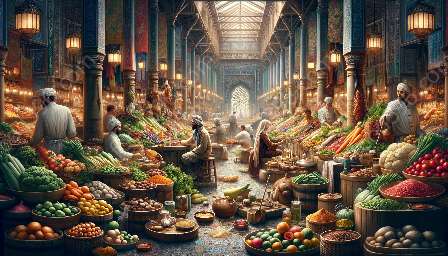During the early modern period, a wave of groundbreaking cookbooks and recipe collections emerged, offering unprecedented insights into culinary practices and dietary traditions. This period saw the convergence of various influences, leading to significant shifts in cooking techniques, ingredient usage, and dining customs.
Early Modern Cuisine History
Early modern cuisine history is a captivating study of the gastronomic evolution that occurred between the late 15th and early 18th centuries. This era witnessed the introduction of new foodstuffs from the Americas, the refinement of culinary techniques, and the proliferation of innovative cookery literature.
Cuisine History
Understanding the development of cuisine history entails delving into the social, economic, and cultural factors that have shaped culinary practices throughout different time periods and geographic regions. It involves examining the influences of trade, migration, agricultural advancements, and technological innovations on food production, consumption, and cultural identity.
Exploring Notable Cookbooks and Recipe Collections
Discovering the remarkable cookbooks and recipe collections originating from the early modern period offers valuable insights into the culinary landscape of the time. These texts not only provide historical recipes but also offer glimpses into the social, religious, and practical aspects of food and dining during this transformative era.
The Art of Cookery Made Plain and Easy (1747) by Hannah Glasse
An influential figure in the history of cookery literature, Hannah Glasse produced one of the most enduring cookbooks of the 18th century. 'The Art of Cookery Made Plain and Easy' showcased a wide range of recipes, emphasizing accessible and practical cooking methods tailored for domestic use. Throughout its numerous editions, this cookbook shaped the culinary preferences and practices of households across England and its colonies.
The Compleat Housewife: or, Accomplish'd Gentlewoman's Companion (1727) by Eliza Smith
Eliza Smith's comprehensive work stood as a testament to the evolving culinary culture of the early modern period, as it presented a diverse collection of recipes and instructions covering everything from cooking and baking to preserving and distilling. It reflected the increasing interest in culinary arts among the rising middle class and added to the proliferation of home-based cooking and entertaining.
The English Huswife (1615) by Gervase Markham
Gervase Markham's 'The English Huswife' emerged as a pivotal text that encapsulated the domestic management and culinary expertise required of an ideal English housewife. It featured a wealth of recipes and advice on various aspects of household management, reflecting the social expectations and gender roles of the period. Markham's work provided a window into the practical aspects of early modern domestic life.
Impact of Early Modern Cookbooks on Cuisine History
Notable cookbooks and recipe collections from the early modern period had enduring repercussions on the development of cuisine history. They not only documented the prevalent culinary practices but also contributed to the standardization and dissemination of recipes, fostering a sense of culinary identity and tradition. These texts served as cultural artifacts that preserved and transmitted culinary knowledge across generations, forming the foundation of modern culinary traditions and practices.
Conclusion
Exploring the notable cookbooks and recipe collections from the early modern period provides valuable insights into the culinary, social, and cultural landscapes of this transformative era. These texts continue to influence our understanding of early modern cuisine history and cuisine history as a whole, shedding light on the diverse traditions and innovations that have shaped our culinary heritage.

